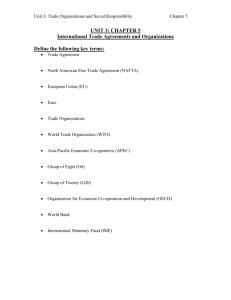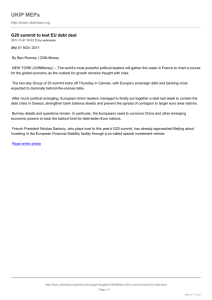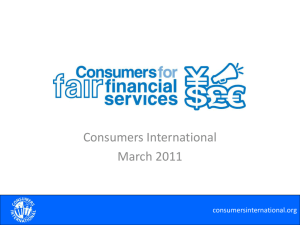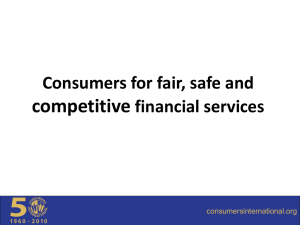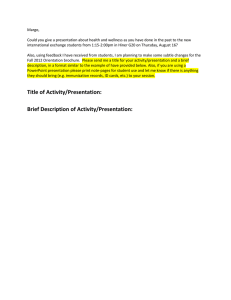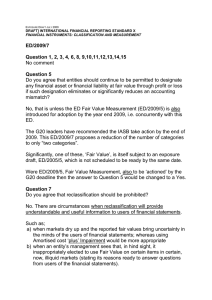Making Global Policy Cooperation Happen OECD Hur, Kyung Wook
advertisement
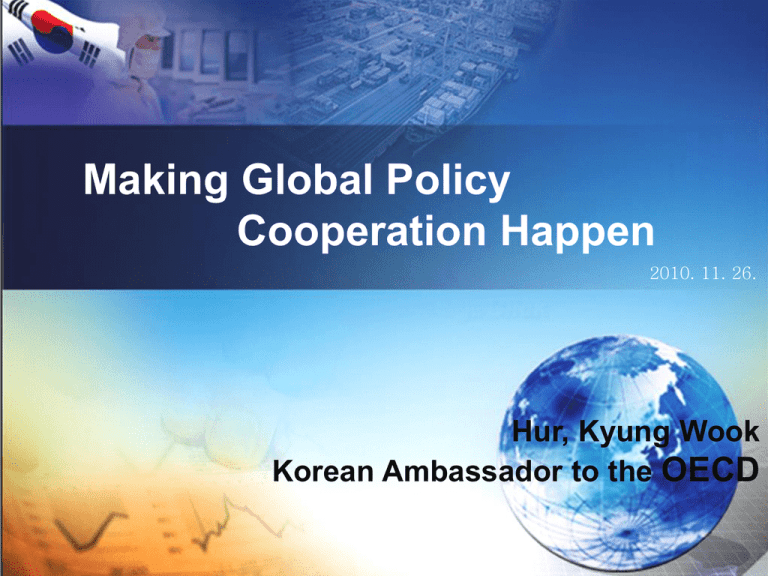
Making Global Policy Cooperation Happen 2010. 11. 26. Hur, Kyung Wook Korean Ambassador to the OECD 1 Contents I Introduction II Lessons III Korea´s Role in Global Public Goods IV Conclusions 2 I. Introduction Why Global Public Goods? Problems become Global in Nature Man of the Millennium (WP ’97) : Genghis Khan - The World has been shrunken Globalisation and Technological Development - 1989 Fall of the Berlin Wall - China’s Embrace of Market Economy - India’s Reform Approach Korea, G20, ASEAN+3 (CMIM) 3 II. Lessons 1. Global Crisis Forces Collective Actions Easier Cooperation during Crisis Free Rider G20(1999), CMIM(2000): Takes two Crises Without Urgency → Momentum is lost COP 15(Copenhagen) : Kyoto Deadline 2012 CMIM: ASEAN+3 Multilateralisation + Increase in Capital (2006) Challenge of G20 → Institutionalisation after Mexico 4 2. Leadership Often by Hegemonic Countries ⇒ G20: Mutual Cooperation and Ideas Role of Bridge or “Honest Broker” G20: Korea as a Bridge between Advanced & Emerging Countries CMIM: Korea between China and Japan Act of“Bring-in” ASEAN: more voices GDP share GDPthan Share CMIM Share Max Drawing(%) ASEAN 12.8 20 52.3 China 37.4 32 15.9 Japan 41.8 32 15.9 Korea 8.0 16 15.9 Ideas New Agenda(Development, FSN) Exchange Rate to Current Account Balance 5 3. Objective Analysis to show Shared Benefits International Expertise were brought in → Altogether 24 International Institutions in the Seoul Summit Declaration Technical Expertise with Political Perspective in W/G Countries(Chair: 1 Advanced, 1 Emerging economy) Supported by Technical Groups (Experts from International Organisations) - Example : Framework W/G(Canada, India / IMF, WB, OECD) FSN W/G(UK, Korea / IMF, WB, BIS) Check and Balance among International Institutions Example - Development Issues: UN, WB, OECD, WTO, UNCTAD, ILO, ADB, AfDB, IDB, IsDB - Anti-Corruption: UN, OECD, IMF, WB, FATF 6 4. Fair Representation: Basis for legitimacy and ownership Conflict between Legitimacy and Efficiency When driven by the crisis, you need an efficient mechanism with supplementary measures G20 as Premier forum for int’l Economic Cooperation 85% of World GDP, 2/3 of Population, 80% of Trade Advanced + Emerging Economies with Equal Voice 60.0 GDP based on PPP share of world total(%) G7 50.0 G20(non G7) 40.0 30.0 1992 1995 2000 2005 2010 2015 - IMF’s Constraints • IMF Quota(%) 1998~2006: Belgium(2.16), India(1.95), Brazil(1.42) 2008~ : Belgium(1.93), India(2.44), Brazil(1.78) 7 To Enhance Legitimacy: Bring in Outside Stakeholders G20 - Agenda to Capture Interests of 172 Nations ⇒ Development - Outreach to Other Countries ∙ 5 times/month - Private Sector: Business Summit ∙ not a sideshow, but essential part of growth recovery CMIM (Chiangmai Initiative) - IMF’s Initial Opposition (Moral Hazard) ⇒ 80% to link with IMF Conditionality FSB (Financial Stability Board) - Established in 1999 (G7 + 5) - Expanded to 24 countries in 2009 (London G20 Summit) ⇒ Basis for adopting BASEL III and other Financial Regulation Reforms Built-in Mechanism to ensure Fair Representation At least 2 out of 5 invitees from Africa IMF’s Quota renew: every 8 years OECD’s Efforts for EE5 a & AA5 8 5. Balance of Interests Zero-sum Game vs Positive-sum Game Comprehensive Agenda to enable quid-pro-quo Trade Negotiation - Manufactured Goods, Agricultural Goods, Services G20’s 10 Major Agenda: Balance between Advanced & Emerging Countries - Exchange Rate & Current Account Balance - IMF/IBRD Quota Reform to bring in Emerging Economies Safeguards to swallow Bitter Pills Financial Safety Net (FSN) to help reduce Reserve Build-up Chiangmai “Escape Clause” Korea-US BIT with “Safeguard” for Emergency Capital Control OECD, WTO G20: Deputies and Sherpas (Technical vs Political) W/G Chaired by two Countries(Advanced and Emerging) 9 6. Trust Trust Building → Repeated Game with Trusted Partners Delivers Better Results Trust was built from the bottoms up at all levels G20 Seoul Summit G20 related meetings: around 5 times a month! Outreach: around 5 times a month Separate Meeting among Central Banks/Finance Ministers - Central Banks (BIS, SENCEN, EMEAP): around 10 times/yr CMIM After 1997 Crisis, 3 Country Meeting among DGs was set up Annual Soccer Meetings, Mutual Visit 10 7. Monitoring of Implementation Monitoring & Feedback is the KEY Detailed Time Table, Action Plans, and Deliverables need to be Defined. G20 MAP (Mutual Assessment Program) aided by IMF and other Int’l Institutions Development : 16 Action Programs CMIM Asean+3 Macro-economic Research Office (AMRO): Agreed to establish in May, 2011. Institutionalization Objective follow-up on Commitments 11 III. Korea´s Role in Global Public Goods Unique Position Bridge between Advanced & Emerging Economy - From Aid Recipient to Donor Country in One Generation - Overcome two economic crises - First G20 Presidency in Asia and Emerging Economy Global Public Goods Troika in G20 Summits Green Growth Development - Recent & Relevant Experience - HLF-4 in 2011 Nuclear Security Summit (2012) Climate Change : COP 18 in Korea (2012) expected Close Cooperation with the OECD 12 IV. Conclusions Prerequisite to International Cooperation : Similar to MRH Why Waste a Crisis G20 Why Waste a G20 Institutionalization 13 ※ Afterthought Current Account Balance Remaining Agenda in FSN Capital Control when Necessary 14 Thank you 15
